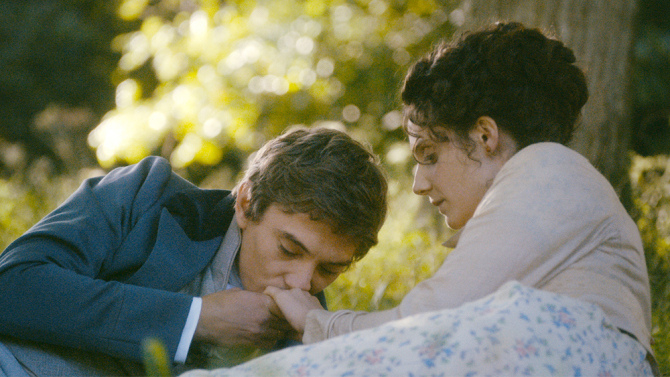
A WOMAN’S LIFE (Une vie)
Kino Lorber
Reviewed by: Harvey Karten, Shockya
Grade: B+
Director: Stéphane Brizé
Written by: Stéphane Brizé, Florence Vignon
Cast: Judith Chemla, Jean-Pierre Darroussin, Yolande Moreau, Swann Arlaud, Nina Meuriss
Screened at: Review 2, NYC, 4/25/17
Opens: May 5, 2017
Life is not as good or bad as you think. This quote, uttered by a maid and showed as a quick epilogue, sums up not only “A Woman’s Life” but a lot of other films, stories and plays as well. By illustrating this epiphany, co-writer and director Stéphane Brizé, whose film “The Measure of a Man” deals with an unemployed factory worker who tries to make ends meet, now takes on people in the minor nobility of France who also struggle financially to survive. If unemployed workers are bereft of wages and thereby destitute, you can expect their “betters,” people with titles, to throw away their fortunes through gambling and wildly speculative investments.
“A Woman’s Life, “ which is based on Guy de Maupassant’s “Une vie” or “A Life” (which should have been this movie’s title since the misfortunes and glad tidings are not gender-specific), was the writer’s first novel, serialized in 1883 in the Gil Blas, then published in book form as “L’Humble vérité.” The novel, which was the basis for the 1958 film “One Life” directed by Alexandre Astruc, is given new and splendid life this year, well deserved if you believe Leo Tolstoy who called the book Maupassant’s best work, and the finest novel since Victor Hugo’s Les Misérables. As miserable as the folks in “A Woman’s Life” became, Maupassant, whose specialty was the short story, does not begin to approach Hugo’s epic form, but focuses on the life of one woman. Photographed by Antoine Héberlé in French Normandy where the novel’s action takes place as well, and distributed to theaters who will use the almost square 4:3 aspect ratio, “A Woman’s Life” finds Jeanne du Perthuis des Vauds (Judith Chemla) returning from convent school to her chateau where she leads the good life, strolling about with her father Baron Simon-Jacques (Jean-Pierre Darroussin) and especially close with her mother Adélaïde (Yoland Moreau). Sure that life could not possibly be better, she has the questionable luck of being courted by Julien de Lamare (Swann Arlaud), who pledges that he will love her forever. Perhaps there’s a bad omen: as she is losing her virginity to a man who is probably experienced, she grimaces, asking him to stop—though perhaps she grew to like his embraces in time.
And wouldn’t you know that honeymoon periods end in 19th Century France as they do in America, because soon enough the viscount complains that his wife is spending too much on wood and on candles, but that’s the good news. The bad news is that her loyal maid Rosalie (Nina Neurisse) has a baby and refuses to reveal the name of the father—but we in the audience can figure that out immediately. Julien seems determined to spread his seed even to Countess Gilberte de Fourville (Clotilde Hesme), the wife of his friend Georges (Alain Beigel). In a typical American melodrama, guns and knives would be drawn and blood would flow. But director Brizé is too restrained, too classy for that.
Jeanne may have expected a year-long summer given the way her handsome husband would cherish her forever, and is closely attached to her own loving son, Paul de Lamare (Finnegan Oldfield), who serves by now as the only redeeming thing in her life. But when Paul exploits poor Jeanne, and when financial tsunamis intrude, the good life is long lost to the woman whose experiences are on exhibit.
Aside from the director’s admirable restraint illustrating a life that alternately promises and betrays, “A Woman’s Life” could probably not have charmed an audience had the principal character been other than Judith Chemla. Closeups from the hand-held camera show her in virtually every stage of emotion, from the pain of her deflowering, to the joy in her love of a handsome aristocrat; from the promise of a life of easy leisure on the farms that she inherits from her father, to the disasters that appear to grow in intensity as though fate has a way of bullying people at vulnerable points in their lives.
The film embraces the cynicism for which novelist Maupassant is known, a writer who near the end of his life attempted suicide, was sent to an institution, and whose death from syphilis was preceded by his writing an epitaph: “I have coveted everything and taken pleasure in nothing.”
Unrated. 119 minutes. © Harvey Karten, Member, New York Film Critics Online
Comments, readers? Agree? Disagree? Why?
Story – B+
Acting – A-
Technical – B+
Overall – B+





